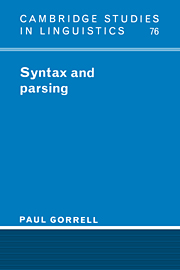1 - Introduction
Published online by Cambridge University Press: 30 March 2010
Summary
There should be clear linkages between linguistic descriptions and cognitive/perceptual requirements.
William Marslen-WilsonSince the mid-1970s specific proposals for the form of syntactic knowledge have had difficulty finding their way into theories of language comprehension. This is not to say that syntax does not play a role in such theories, but it is usually limited to a reference to a fairly imprecise phrase structure. Much of the work that is of interest to syntacticians provokes (at best) scant interest from those working in experimental psycholinguistics. To a certain extent this is justified; investigations into syntactic knowledge and into sentence processing are related, but clearly distinct, research programs.
It is a central thesis of this book that recent work within Government-Binding (GB) theory (Chomsky 1981, and subsequent work) raises questions about the nature of syntactic knowledge that have long concerned researchers into syntactic processing (parsing). Consider the term minimal. Since the important work of Frazier and Fodor (1978), which introduced the concept of Minimal Attachment to the psycholinguistics literature, the concept of minimal structure building has played a significant role in studies of properties of the parser. More recently, work in syntactic theory has become concerned both with insuring minimal structure generation (e.g. Speas 1990) and with establishing minimal connections between related elements within a structure (e.g. Rizzi 1990). As will become clear below, the form of the grammar within much current work in GB requires principles of minimal structure generation in much the same way that properties of the parser require a principle of minimal structure computation.
- Type
- Chapter
- Information
- Syntax and Parsing , pp. 1 - 8Publisher: Cambridge University PressPrint publication year: 1995



